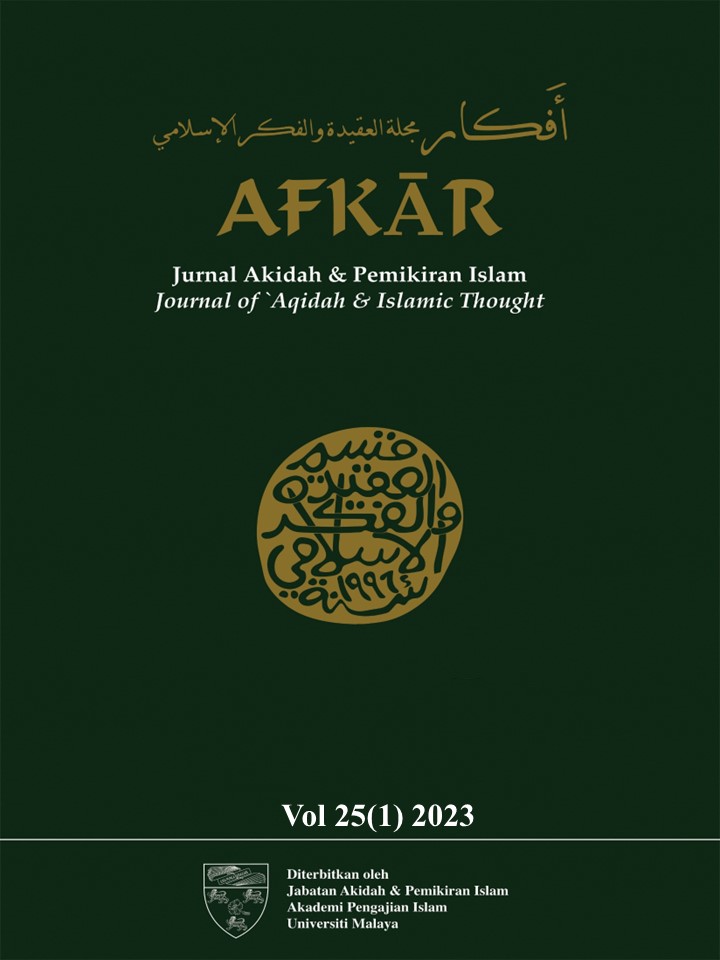Developing Islamic Psychospiritual Guidelines for Covid-19 Task Counsellors
DOI:
https://doi.org/10.22452/afkar.vol25no1.5Keywords:
Islamic Psychospiritual, Islamic counselling, Muslim counsellors, Covid-19Abstract
The Covid-19 pandemic has left significant implications on the emotional and psychological health as well as their personal well-being. As an effort in managing the problem, many individuals undergo counselling sessions with counsellors in the hope of gaining emotional and psychological support. However, the continuous dumping of client narratives during the Covid-19 pandemic has led to repercussions on emotional stress such as Secondary Traumatic Stress (STS) problems for these counsellors. By considering the solution to this problem from the Islamic perspective that states that human beings are also made up of the spiritual aspect, this study is aimed at developing an Islamic psychospiritual guideline for counsellors on duty during the Covid-19 pandemic. The study is conducted in three phases; the Needs Analysis Phase, Guideline Development Phase and Evaluation Phase. In the Needs Analysis Phase, literature review and interviews are employed to identify the items needed in the development of the guidelines. The guideline development phase is the process of completing the draft guidelines using the psychospiritual counselling theory as the foundation. This theory is an approach that combines the spiritual and religious aspects derived from the Qur’an and Hadith. Next is the evaluation phase where the guidelines developed are evaluated and validated by experts in the field of Islamic counselling, psychology and psychospiritual. This study presents the Islamic psychospiritual guidelines as preparation for counsellors in facing clients in an effort to avoid psychological disorders. The guidelines consist of two classifications namely; 1) mental and emotional preparation as a daily practice, before, during and after a session; and 2) spiritual preparation as a daily practice, before, during and after a session. It is hoped that these guidelines can be applied in the practice among Muslim counsellors as a holistic preparation that embraces the psychological and spiritual balance based on Islamic teachings.
Downloads
References
Abdul Aziz, A., Mohd Sukor, N., & Ab Razak, N.. “Wabak Covid-19: Pengurusan Aspek Kesihatan Mental Semasa Norma Baharu.” International Journal of Social Science Research 2(4) (2020): 156-174.
Abdul Rashid Abdul Aziz, Amin Al Haadi Shafie, Zuraina Ali & Noor Dahiah Sulhana Dzainal. “Pengamalan Nilai Agama dalam Mengatasi Kemurungan Semasa Pandemik COVID-19.” Malaysian Journal of Social Sciences and Humanities (MJSSH) 5(12) (2020): 31-44.
Aisha Utz. Psychology from the Islamic Perspective. Kuala Lumpur: International Islamic University Malaysia, 2011.
Che Zarrina Sa‘ari & Sharifah Basirah Syed Muhsin. “Cadangan Model Psikoterapi Remaja Islam Berasaskan Konsep Tazkiyah al-Nafs.” Jurnal Usuluddin 36 (2012): 49-74.
Che Zarrina Sa‘ari, Mohd Syukri Zainal Abidin, Siti Sarah Hj. Ahmad, Syed Mohammad Hilmi Syed Abdul Rahman, Mohd Khairul Naim Che Nordin, Sharifah Basirah Syed Muhsin, Mohd Manawi Mohd Akib. “The Development of Islamic Psychospiritual Scale for Drug Addicts.” Afkar: Jurnal Akidah & Pemikiran Islam 22(2) (2020) 279–312. https://doi.org/10.22452/afkar.vol22no2.8
Chu, Hui-Chun & Hwang, Gwo-Jen. “A Delphi-Based Approach to Developing Expert Systems with the Cooperation of Multiple Experts.” Expert Systems with Applications 34(4) (2008): 26-40.
Chua Yan Piaw. Kaedah Penyelidikan: Kaedah Dan Statistik Penyelidikan, Buku 1. Malaysia: McGraw Hill, 2011.
Fariza Md Sham. “Elemen Psikologi Islam dalam Silibus Psikologi Moden: Satu Alternatif.” Global Journal Al-Thaqafah 6(1) (2016): 75-85.
Al-Ghazali, Abu Hamid Muhammad bin Muhammad. Ihya’ ‘Ulum al-Din, 3. Beirut: Dar al-Kutub al-‘Ilmiyyah, 2001.
Gilbert, Peter. “The Spiritual Foundation: Awareness and Context for People Live’s Today.” In Spirituality, Values and Mental Health: Jewels for the Journey, eds. Peter Gilbert, Vicky Nicholls & Mary Ellen Coyte. Philadelphia: Jessica Kingsley, 2007.
Hajah Noresah Baharom et al.. Kamus Dewan, Edisi Ketiga. Kuala Lumpur: Dewan Bahasa dan Pustaka, 2002.
Horesh, D. & Brown, A. D.. “Traumatic Stress in the Age of COVID-19: A Call to Close Critical Gaps and Adapt to New Realities.” Psychol Trauma 12(4) (2020): 331-335.
Idris Awang. Penyelidikan Ilmiah: Amalan dalam Pengajian Islam. Shah Alam: Kamil dan Shakir Sdn. Bhd., 2009.
Lai, Jianbo et al. “Factors Associated with Mental Health Outcomes among Health Care Workers Exposed to Coronavirus Disease 2019.” JAMA Netw Open 3(3) (2020): 1-12.
Mohd Abbas Abdul Razak & Nik Ahmad Hisham. “Islamic Psychology and the Call for Islamization of Modern Psychology.” Journal of Islam in Asia 9(1) (2012): 156-183.
Mohd Rushdan Jailani. “Integrasi Terapi Psikospiritual Islam dalam Modul Rawatan dan Rehabilitasi Berasaskan TC (Therapeutic Community).” Proceeding International Drug Prevention and Rehabilitation Conference (Prevent 2015), November 23-24, 2015, Akademi Koreksional Langkawi: 98-109.
Nur Hamim. “Religious Anthropocentrism: The Discourse of Islamic Psychology among Indonesian Muslim Intellectuals.” Journal of Indonesian Islam 4(2) (2010): 341-357.
Nurrussakinah Daulay. Pengantar Psikologi dan Pandangan al-Quran Tentang Psikologi. Indonesia: Kencana Prenada Media Group, 2014.
Rogers, Adam A., Thao Ha & Ockeya, Sydney. “Adolescents’ Perceived Socio-Emotional Impact of COVID-19 and Implications for Mental Health: Results from a U.S.-Based Mixed-Methods Study.” Journal of Adolescent Health 68(1) (2021): 43-52.
Russell, James D.. Modular Instruction. A Guide to the Design, Selection, Utilization and Evaluation of Modular Materials. Minneapolis, Minnesota: Burgess Publishing Company, 1974.
Schensul, S, L. et. al. Essential Ethnograpic Methods: Ethnographers Toolkit. New York: Altamira Press, 1999.
Tohirin. Perspektif Psikologi Islam Tentang Kecerdasan: Psikologi Islam, Falsafah Teori dan Aplikasi. Bangi: Universiti Kebangsaan Malaysia, 2016.
Vandenbos, Gari R.. APA Dictionary of Psychology. Washington: American Psychological Association, 2006.
Downloads
Published
How to Cite
Issue
Section
License

This work is licensed under a Creative Commons Attribution-NonCommercial 4.0 International License.









